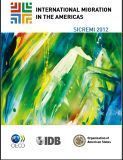- English
- Español
Migration
Education of Children and Young Migrants

Background and brief description of the project
The "Education for migrant children and youth" with a duration of three years
projected the documentation, systematization and dissemination of lessons
learned from policies, programs and best practices aimed at providing quality
educational experiences for children and young migrants. The expected results
include raising awareness and capacity in education ministries and agencies of
the Americas on the development, implementation and evaluation of programs to
improve educational opportunities and outcomes for this population.
The project is part of a component within the Inter-American Program for Human
Rights of Migrants and their Families, adopted by resolution AG / RES. 2141
(XXXV-O/05). It was funded by the Canadian International Development Agency (CIDA)
through a budgetary allocation of U.S. $ 200,000 - for three years. It was
executed by the Office of Education and Culture (OEC) of the Executive
Secretariat for Integral Development of the OAS (SEDI).
Project Stages
The project embraces three main stages. In the first stage, which was carried
out throughout 2009, the objectives were:
1) Document the size and nature of the phenomenon (the situation of migrant
children and youth in the Member States) and
2) To document and analyze relevant policies and educational programs at a
national level.
Based on the work done at this stage, the Office of Education and Culture
conducted a literature review on the topic, they implemented a survey to the
Ministries of Education and prepared an analytical report on public policy in
education for migrant children and youth to be distributed in various technical
and political forums of the OAS. Furthermore, they published an online
newsletter on the topic.
In 2010, the project developed three small case studies in Argentina, Costa Rica
and Antigua and Barbuda to learn about experiences, needs and challenges of
immigrant communities in the Americas on the issue of education of children and
youth. Initially, the objective of the second stage was to "compile relevant
information of innovative initiatives on education in the hemisphere who have
had good results for children and young migrants," but has been reformulated in
light of the results of the first stage. In the first half of 2011, the results
of these case studies were published and an international seminar was organized
to discuss the findings and recommendations for developing policies to address
children and young migrants.

For more information about this project please contact us migration@oas.org





